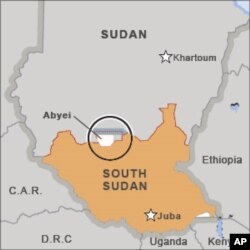The United Nations’ peacekeeping chief says the security situation in the disputed region of Abyei, which both Sudan and South Sudan claim, is fragile. Hervé Ladsous told the Security Council on Thursday that a joint border monitoring mechanism needs to be created to build confidence between the two sides and prevent a return to war between the two states.
The head of peacekeeping said the armed forces of Sudan and South Sudan have not withdrawn from the area, in violation of a June agreement between the parties. Hervé Ladsous told the 15-member Security Council that in some towns and villages there are troops present and that in others the parties are substituting their police forces.
“Personnel of the South Sudan police force are still present within the area and it seems that the two parties are currently in the process of replacing their military staff with police officers, and this also contravenes the letter and spirit of the agreement of the 20th of June," said Ladsous.
In June, the Security Council authorized the deployment of up to 4,200 Ethiopian troops to Abyei, after Sudan and the Sudan People’s Liberation Movement agreed in Addis Ababa to demilitarize the disputed zone and let Ethiopian troops monitor the area. The peacekeeping force, which is known by its acronym UNISFA, is about 70 percent deployed.
Ladsous told the council it is important that it urge the parties to reach an agreement on mapping of the border zone and on the locations for a monitoring mechanism. He also asked the Security Council to consider the U.N. secretary-general’s request to expand the mission’s mandate to incorporate support for the border mechanism, including logistical and air support, observers and force protection.
The tensions between Sudan and South Sudan were evident in the council when their ambassadors spoke.
Referring to a recent deadly clash in the town of Jaw, South Sudan Ambassador David Buom Choat stressed that Jaw is part of South Sudan. Khartoum’s Ambassador Daffa-Alla Elhag Ali Osman disputed that, saying the town is part of Sudan.
The two ambassadors traded accusations over the nomination of a candidate to the post of deputy chief administrator for the Abyei area. Khartoum’s envoy complained that the south rejected their candidate, stalling the process of setting up the Abyei Area Administration. South Sudan’s ambassador said the candidate was rejected because he was not a resident of the area.
Tensions have been growing between Khartoum and Juba since the south declared its independence in July after a referendum on secession from Sudan.




